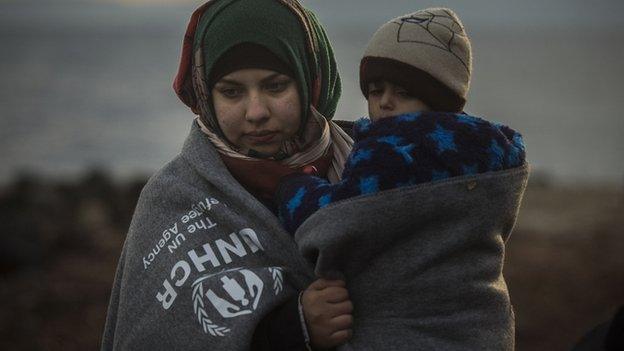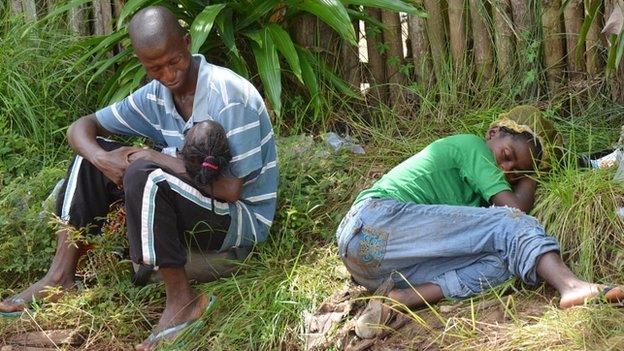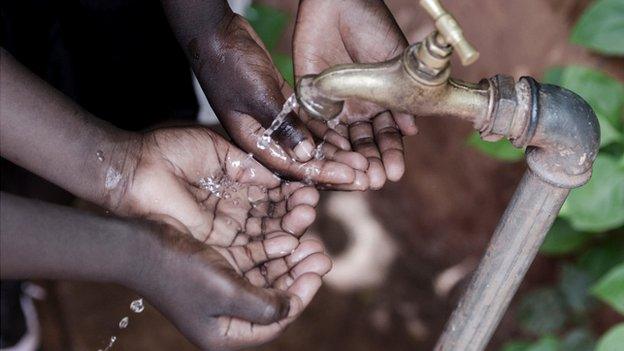Does the UK give more aid than other countries?
- Published

The refugee crisis brought extra demands on aid budgets
The UK gives more in international aid than any other developed country apart from the United States, according to figures from the Organisation for Economic Co-operation and Development.
And in terms of donations as a proportion of national income, the UK is in the top five, behind countries such as Sweden and Norway.
The amount given in international aid remains politically charged - with arguments such as whether the UK government should be spending money on flood barriers at home rather than trying to tackle poverty in other countries.
There have also been debates about whether the right people are receiving overseas aid, with worries it might be subsidising corrupt or coercive regimes.
Or should we see aid as not just a humanitarian responsibility, but a form of enlightened self-interest, with long-term, soft-power benefits from helping to shape emerging economies?
The OECD figures, comparing levels of overseas development aid, external, shows that by any measure, the UK is among the biggest donors, ahead in cash terms of countries such as Germany, France and Japan.
This is government aid - not voluntary donations through charities - and it shows that for many countries, the cash donated does not keep up with the promises.
There is a United Nations target that countries should give at least 0.7% of gross national income.
But only Sweden, Luxembourg, Norway, Denmark and the UK reached this in 2014.
Countries such as the United States, Germany, Switzerland and Australia give much less as a proportion.
As global economies have grown, there has been a substantial long-term overall increase in overseas aid - more than trebling in value since the 1960s.
It is now at its highest ever level in cash terms, worth $137.2bn (£93bn).

The Ebola outbreak saw more UK funding for Sierra Leone
But as a proportion of combined national incomes, less is given in aid now by developed countries than in the 1970s and 1980s.
While the UN calls for 0.7% to be spent on "development assistance", the overall average within the OECD is 0.3% of national income.
Unlike this global trend for preferring warm words to cold cash, the UK is now giving a higher proportion of national income than ever before.
In 1999, the UK was giving 0.24%, the amount having fallen steadily for 20 years. The figure has now climbed upwards to 0.71%.
In sharp contrast, the US is now giving 0.18% of its national income in aid, and has not given more than 3% since the early 1970s.
The biggest recipient of international aid was Afghanistan, followed by Vietnam, Syria, Pakistan, Ethiopia, Egypt and Turkey.
The OECD analysis shows to what extent funding can be driven by events. Provisional figures had forecast an overall drop in aid, but the emerging Syrian refugee crisis reversed that, leading, for example, to a sum of $600m (£408m) in extra spending by the Italian government.

As more aid went to the Middle East, there was a 9% reduction for the poorest countries
With conflicts in the Middle East drawing more on aid budgets, the very poorest countries, many in sub-Saharan Africa, saw a 9% decline in aid compared with 2013.
These figures show international aid from OECD member countries, but the report highlights that some non-OECD countries give a higher proportion of their income, headed by the United Arab Emirates.
There has also been a rise in spending through international organisations. European Union institutions are now major donors, with a bigger aid budget than individual countries such as France.
According to figures published in December, the UK government aid budget is £11.7bn, not including the voluntary fundraising of charities.
In terms of bilateral aid, the biggest recipients of UK funding are Ethiopia, India, Pakistan, Sierra Leone and Nigeria, with the Ebola crisis prompting more support for Sierra Leone.
But what should be the funding priority? How should basic humanitarian assistance be balanced against investment in education and infrastructure?
It's often shaped by short-term emergencies, rather than such long-term questions.
A report from MPs on the Syrian refugee crisis, external, from the International Development Committee, says that as recently as 2011, the Middle East only received a tiny fraction of the UK aid budget, but this has now grown to £1.1bn.
While the UK is paying its "fair share" of relief funding, it warns of a "shortfall" in support from countries such as France, Japan and Italy.
The funding gap means a lack of basic support for what has been described as the biggest humanitarian crisis since World War Two.
The direct consequence, says the cross-party report, is that more refugee families are driven towards the shores of Europe.
Rather than the UK giving too much, the MPs argue that others are giving too little: "The government should use all available channels to press other donors into making adequate contributions to the fund."